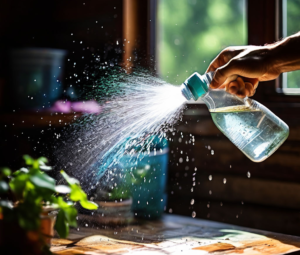When it comes to natural cleaning solutions, vinegar as a cleaning agent stands out as a true household hero. With the rising trend of eco-friendly living and a growing awareness of the chemicals in commercial cleaning products, many people in London, Ontario, and worldwide are turning to vinegar for a safe, effective, and affordable way to clean their homes. This humble pantry staple is more than just a condiment—it’s a powerful cleaner that can tackle tough stains, disinfect surfaces, and leave your home sparkling clean.
Whether you’re a homeowner, tenant, or student in London, Ontario, dealing with the changing seasons, vinegar offers a versatile solution that’s both kind to the environment and gentle on your wallet. At CleanHelp Canada, we understand the importance of using effective, natural cleaning methods to maintain a healthy home environment. In this blog, we’ll explore the different types of vinegar, how vinegar as a cleaning agent works, and the benefits it brings to your household cleaning routine. Plus, we’ll share some top vinegar cleaning hacks for every room in your home and provide essential do’s and don’ts to ensure you’re using vinegar safely and effectively.
1. Understanding Vinegar: Types and Their Uses
Not all vinegars are created equal, especially when it comes to cleaning. Understanding the different types of vinegar and their specific uses can help you get the most out of this natural cleaning agent.

- White Vinegar: The most common type used for cleaning. It’s made from acetic acid diluted with water and is great for general cleaning, disinfecting, and deodorizing.
- Apple Cider Vinegar: Though more often used in cooking, it can also be a cleaning agent, particularly for removing stains and odors.
- Balsamic Vinegar: Typically not used for cleaning due to its dark color and higher price point. It’s best reserved for culinary purposes.
- Cleaning Vinegar: A stronger version of white vinegar, with a higher concentration of acetic acid (around 6%), making it even more effective for tough cleaning tasks.
For household cleaning, white vinegar and cleaning vinegar are your go-to options. They’re powerful enough to cut through grease, dissolve mineral deposits, and remove stains while being safe to use on most surfaces.
2. How Vinegar as a Cleaning Agent Works
Vinegar’s cleaning power comes from its high acidity level. The acetic acid in vinegar works to break down dirt, grease, and grime, making it easier to wipe away. Here’s how it works:

- Dissolving: The acidity of vinegar helps dissolve mineral deposits, such as lime scale and soap scum, making it effective in bathrooms and kitchens.
- Deodorizing: Vinegar as a cleaning agent neutralizes odors by binding to volatile molecules, reducing unpleasant smells in your home.
- Disinfecting: While not as strong as commercial disinfectants, vinegar can kill some bacteria and viruses, making it a safer option for everyday cleaning.
This natural ability to clean and disinfect without harsh chemicals makes vinegar an excellent choice for households looking to maintain a healthier living environment.
3. Benefits of Using Vinegar for Cleaning
Why should you choose vinegar over commercial cleaning products? Here are some compelling benefits:
- Eco-Friendly: Vinegar is biodegradable and doesn’t release harmful chemicals into the environment, making it a greener choice for your home.
- Non-Toxic: It’s safe to use around children and pets, unlike many commercial cleaners that contain harsh chemicals.
- Cost-Effective: Vinegar as a cleaning agent is inexpensive and easily available, making it a budget-friendly option for keeping your home clean.
- Versatile: It can be used on a wide range of surfaces, from windows and mirrors to floors and countertops.
- Multi-Purpose: Vinegar not only cleans but also deodorizes and disinfects, reducing the need for multiple cleaning products.
These benefits make vinegar as a cleaning agent an essential tool in any cleaning arsenal, particularly for those who are health-conscious and environmentally aware.
4. Top Vinegar Cleaning Hacks for Every Room
Now that we’ve covered the basics, let’s dive into some practical vinegar as a cleaning agent act as hacks for different rooms in your home. Whether you live in a cozy apartment or a large house in London, Ontario, these tips will help you maintain a fresh and clean environment throughout the year.
Kitchen
- Countertops: Mix equal parts of water and white vinegar as a cleaning agent in a spray bottle. Use it to wipe down countertops and surfaces. Avoid using it on natural stone surfaces like granite or marble, as the acidity can damage them.
- Microwave: Place a bowl of water with a few tablespoons of vinegar inside the microwave. Heat for five minutes, then wipe away any loosened food particles with ease.
- Refrigerator: Wipe down the interior of your fridge with a vinegar solution to eliminate odors and clean up spills.

Bathroom
- Showerheads: Fill a plastic bag with vinegar and secure it around the showerhead. Let it soak overnight to remove mineral deposits and improve water flow.
- Tiles and Grout: Spray a vinegar solution on tiles and grout to remove soap scum and mildew. Scrub with a brush for a deeper clean.
- Toilet: Pour a cup of vinegar into the toilet bowl and let it sit for a few hours before scrubbing. This helps remove stains and deodorize.
Living Room
- Windows and Mirrors: Use a mixture of vinegar and water to clean glass surfaces, leaving them streak-free and sparkling.
- Furniture: Remove water rings from wooden furniture by applying a mixture of vinegar and olive oil. Rub in the direction of the wood grain for the best results.
- Carpets: Treat carpet stains by spraying a vinegar solution directly onto the stain, then blotting with a clean cloth.
Bedroom
- Mattress: Deodorize your mattress by spraying it lightly with vinegar and allowing it to air dry. This helps remove sweat and odor buildup.
- Closets: Keep your closets fresh by placing a small bowl of vinegar inside to absorb musty smells.
- Laundry: Add half a cup of vinegar to the rinse cycle to soften clothes and remove detergent residue.
5. The Do’s and Don’ts of Cleaning with Vinegar
While vinegar is a versatile and powerful cleaner, there are some important do’s and don’ts to keep in mind to ensure safe and effective use.
Do’s:
- Test First: Always test vinegar on a small, inconspicuous area before using it on a larger surface to ensure it doesn’t cause damage.
- Dilute: For most cleaning tasks, dilute vinegar with water to prevent it from being too harsh on surfaces.
- Ventilate: When using vinegar in enclosed spaces, make sure the area is well-ventilated to avoid inhaling strong fumes.
Don’ts:
- Avoid Natural Stone: Do not use vinegar on granite, marble, or other natural stone surfaces, as the acidity can etch and damage the stone.
- No Mixing with Bleach: Never mix vinegar with bleach, as it can produce toxic chlorine gas.
- Use Caution on Hardwood Floors: While some people use vinegar to clean hardwood floors, it’s best to check with the manufacturer’s recommendations, as vinegar can dull the finish over time.
6. DIY Vinegar Cleaning Solutions: Recipes and Tips
Creating your own vinegar-based cleaning solutions is simple and cost-effective. Here are some easy recipes to get you started:
- All-Purpose Cleaner: Mix 1 part white vinegar with 1 part water. Add a few drops of essential oil for a pleasant scent. Use it to clean countertops, sinks, and other surfaces.
- Glass Cleaner: Combine 2 cups of water, 1/2 cup of vinegar, and 1/4 cup of rubbing alcohol in a spray bottle. This mixture will leave your windows and mirrors streak-free.
- Fabric Softener: Add 1/2 cup of vinegar to your washing machine’s rinse cycle. This helps soften clothes naturally and removes detergent residue.
- Drain Cleaner: Pour 1/2 cup of baking soda followed by 1/2 cup of vinegar down the drain. Let it fizz for a few minutes, then flush with hot water to clear clogs and deodorize.
These DIY solutions are not only effective but also free of the harmful chemicals found in many store-bought cleaners.
7. Conclusion: Why Vinegar Should Be Your Go-To Cleaner
In a world where we’re increasingly concerned about the impact of chemicals on our health and the environment, vinegar as a cleaning agent stands out as a natural, effective, and eco-friendly cleaning solution. From the kitchen to the bedroom, vinegar’s versatility, affordability, and safety make it a must-have in every household.
At CleanHelp Canada, we understand the importance of maintaining a clean and healthy home. While vinegar is a fantastic tool for everyday cleaning, there are times when you might need a little extra help. Whether it’s a deep clean or regular maintenance, our professional cleaning services in London, Ontario, are here to support you. We offer top-notch cleaning services to ensure your home remains in pristine condition. Contact CleanHelp Canada today to learn more about how we can help keep your home sparkling clean, naturally.
